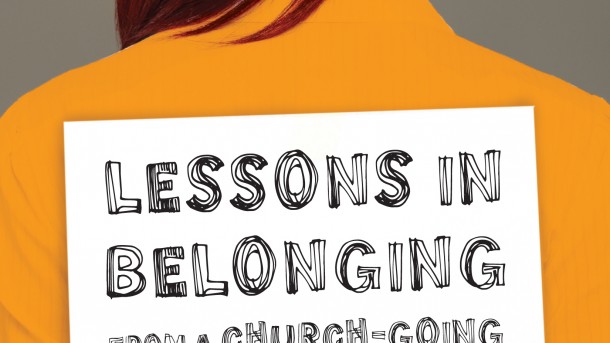I met Erin Lane in 2009 when she was working at the publishing company that published my first book. In that serendipitous way that sometimes happens, our paths have continued to cross over the years. I appreciated her work in Talking Taboo, and I loved reading her heartfelt stories of the struggles- and the desire even in spite of those struggles- to belong in that quirky group of people we call church in her new book, Lessons in Belonging From A Church-Going Commitment Phobe. Erin was gracious enough to share an excerpt with me, from a section I loved about earnestness. I really resonated with this, and I know there are so many people who feel that the uncool nature of earnestness is exactly what we might be looking for. Give it a read, and then go grab her book! Here it is:
It’s earnestness I’m after these days. It’s what I notice in other people and it’s what I’m trying to practice myself. Throughout scripture, the Greek words translated as earnest are found paired with concepts like expectation (Rom 8:19, Phil 1:20), longing (2 Cor 7:7, 2 Cor 7:11), and the down payment of the Spirit (2 Cor 1:22, 2 Cor 5:5, Eph 1:14). People who are earnest aren’t afraid to name what they want even if it undoes them to say so. They aren’t afraid to get their hopes up for realities yet seen or even imagined. In fact, they’re fixated on ideas such as these.[1] Some translations of the Bible even describe their waiting as anxious (eg. Rom 8:19, NASB, Darby) which is the closest I’ve ever come to finding biblical justification for my neuroses.
Sometimes I think I’m drawn to earnestness of late for the same reason hipsters are drawn to fanny packs – it’s so uncool it’s cool. With all the throw-backs to our youth, so prevalent today in movies, music, and fashion, you’d think we’d be better at recapturing some of the zeal of days spent playing baseball in the cul-de-sac with a tennis ball and plastic bat, jellies substituting for tennis shoes and perms masquerading as human hair. But we care too much now about looking foolish. We care that our Christianity comes across as informed, but a bit irreverent. God forbid someone thinks we’re a rule follower. God forbid someone thinks we’ve settled. And perhaps most frightening of all, God forbid someone thinks we could join an institution that asks us to “die to ourselves” when we’re still trying to “find ourselves.” I mean, really, our prefrontal cortex – the area of the brain that helps us make good decisions – isn’t even completely formed until our mid twenties.
I personally love the stories in Scripture where people are accused of being drunk. It’s a kind of foolish one has to embrace to believe that the church can be a miraculous place in which every person, tribe, and nation belongs. (Maybe even more miraculous is the idea that the church can be a place where you and I belong.) It seems impossible but there it is in the long arc of our people’s history: in the pages of the prophet Isaiah who imagines God’s house perched on top of a mountain for all nations to gather round, in the teachings of Jesus who instructs his followers to be widely indiscriminate in their baptizing of all peoples, and in a cacophony of languages that are somehow understood by all on that bewildering day of Pentecost when a few reasonable folks surmised that everyone had to be three sheets to the wind. Because you’d have to be drunk to believe such a vision of the church is possible. You’d have to be drunk to think you’d ever belong to that congregant who refers to “the gays” or your sister-in-law who has faith only in “the energy beneath the floorboards.” But, wouldn’t it be great if this were true? And wouldn’t it be great if we got to participate in co-creating this kind of spirit-filled, holy-fied reality?
Belonging is hard. It begs commitment and compromise and even, yes, sometimes conformity. I know, I know, I’d be tempted to put the book down here, too. But these are the things we must do if we want to grow in our faith. Paul says that such unity helps us to “become mature” and attain “the fullness of Christ” (Eph 4:12-13). Maturity and unity are inseparable as we experience communion not just with Christ but with one another. Learning to belong to the body of Christ isn’t just an exercise of the shoulds; it’s the mark of being a Christian who is no longer driven by setting herself apart from those people and is instead ready to build up the church of my people.
Of course, first, I had to find my people.
Excerpted from Lessons in Belonging from a Church-Going Commitment Phobe (Crescendo, 2015) by Erin S. Lane. Erin works for the Seattle-based nonprofit Center for Courage & Renewal as an assistant program director for clergy and congregational leader programs. She has a master of theological studies defree from Duke Divinity School and is coeditor of Talking Taboo. Find more of her writing at www.holyhellions.com.
[1] W.E. Vine, “Earnest,” in Vine’s Expository Dictionary of New Testament Words (Accessed May 31, 2014), <http://www.blueletterbible.org/search/Dictionary/viewTopic.cfm?topic=VT0000962>.

Add Your Voice!